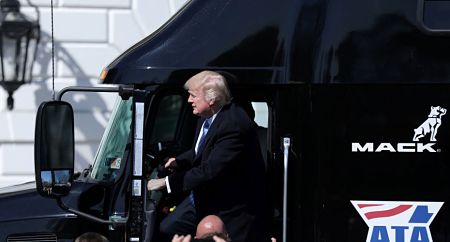Trucking industry pushing Trump Administration for rollback on safety regulations
With the Trump Administration pledging to roll back many federal regulations, America’s trucking industry is optimistic that some laws will either be softened or go away all together.
The trucking industry already scored a victory when Republican lawmakers effectively blocked Obama administration safety rules aimed at keeping tired truckers off the highway.
The trucking industry’s latest win has sparked concern among safety advocates that it may be just the start of a broad rollback of transportation safety regulations.
“Unfortunately, it’s going to be an open season on safety in this Congress,” said Jim Hall, who was chairman of the National Transportation Safety Board during the Clinton administration.
Besides pre-empting state laws on rest breaks, it’s also likely that shippers and some segments of the trucking industry will push for long-sought goals of increasing the weight limit on trucks to more than 90,000 pounds and increasing the length of individual trailers from 28 feet to 33 feet, safety advocates said.
“It’s going to be very tough because the companies really care about the cost. They don’t care about the safety no matter what they say,” said safety advocate Joan Claybrook.
The provision Republicans added to a government spending bill suspends regulations issued by the Obama administration requiring truckers to take two nights off to rest after a work week of up to 80 hours.
Truckers are required to take a 34-hour break after at the end of a work week. But the trucking industry objected to requirements that the 34 hours include two periods from 1 a.m. to 5 a.m. Sleep scientists say rest during the early morning hours is critical for people to feel refreshed. The suspension means truckers can head out on the road again during those hours if the 34-hour break has elapsed.
Another regulation suspended would have prevented truckers from using the minimum 34-hour break before they start a new work week twice in a 7-day period.
“Poor roads and bridges cause huge congestion and eat up the hours of service that truck drivers are allowed on the road,” said Randolph Smith, national transportation industry practice leader at Grant Thornton, a tax advisory firm.
The transportation industry views Elaine Chao, the new Transportation Secretary, as a pro-business Republican. “The industry is pretty confident that under the new transportation secretary, there’ll be a roll back on that and other regulations,” Smith said.
One federal regulation trucking companies doubt will change or be modified is the requirement that all commercial vehicles must be equipped with electronic logging devices, or ELDs. The Federal Motor Carrier Safety Administration has mandated that all motor carriers have the devices installed by Dec. 18, 2017.
“All the major carriers are behind it, and most of the large companies are already compliant,” Smith said.
But the ELD mandate also could contribute to a consolidation of the trucking industry and a reduction in capacity, Smith said. With 97 percent of the trucking industry is made up of carriers with 20 vehicles or less, some small trucking companies may choose to shut down rather than pay the expense of the devices and the cost to comply with the regulation, Smith said.
“Some small carriers will choose to go out of business rather than pay for the devices and comply with the regulation,” Smith said.
This could contribute to the general consolidation of the trucking industry, Smith said. Small carriers are already feeling the pressure from Amazon and others to ship goods faster at lower costs. The trend toward using more technology to track shipments will only heighten the pressure.
“Technology is really driving the supply chain,” Smith said. “If you’re not ahead of the technology curve, you’re probably going out of business.”
Besides truck safety, Congress is also likely to be asked to deal with a wide range of other transportation safety concerns.
The auto and technology industries, for example, are telling Congress that they fear a “patchwork” of state safety laws will hinder the deployment of self-driving cars. National Highway Traffic Safety Administration officials have developed voluntary guidelines for the safe design, development, testing and deployment self-driving cars that they want automakers to follow.
Some industry officials have complained the guidelines go too far and may stifle innovation. Safety advocates say they don’t go far enough.
“We think it would be completely inappropriate for Congress to pre-empt the states without strong federal safety standards in place for automated vehicles,” said William Wallace, a policy analyst for Consumers Union, the policy and mobilization arm of Consumer Reports.






